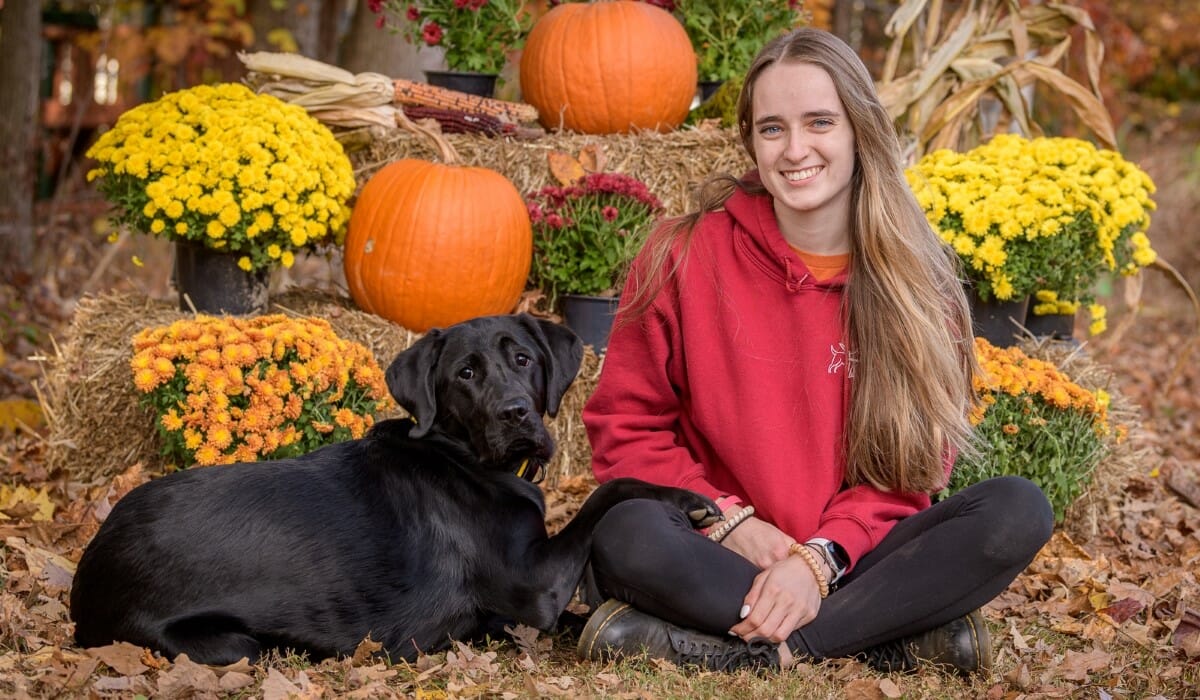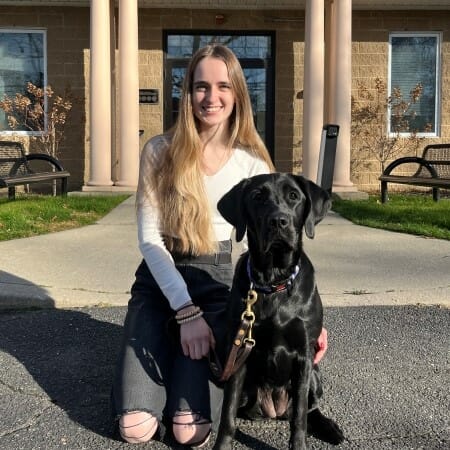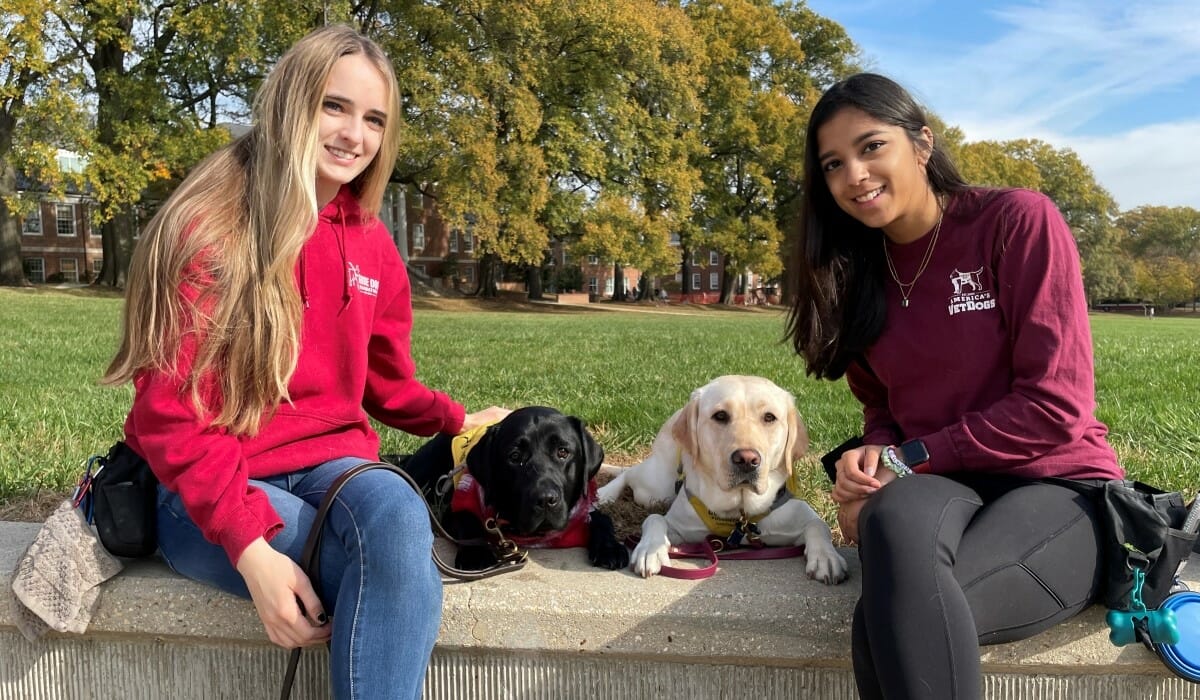College Student Raises Service Dogs and Advocates for Those Who Need Them

Meet Daily Point of Light Award honoree Lexi Kruger. Read her story and nominate an outstanding volunteer or family as a Daily Point of Light.
Lexi Krueger loves dogs. Growing up with multiple pups at once, freshman year of college was the first time in her life she lived without a four-legged friend. In another first, she has recently moved out of Maryland for the first time to set up in Boston for medical school. While her two German shepherds, Dexter and Poppy, will stay with family, Lexi won’t be living alone.
During her dogless period in 2019, Lexi discovered America’s VetDogs and the Guide Dog Foundation through on-campus chapters and has been raising service dogs for both veterans and the blind or visually impaired ever since, getting them used to being out in public and adding to and reinforcing training each week. She is also an area coordinator and PTSD curriculum mentor.
Mary, her nine-month-old service dog in training — her fourth — is on the PTSD track and will accompany Lexi as she goes about her days, including her lectures. As she looks ahead, facing the long hours of residency and beyond, she hopes to finish Mary’s training and stay connected to the organizations she serves in other ways until she can one day get back to what she likes best, raising dogs.
What inspires you to volunteer?
We always say that if you have a dog in a yellow vest, it’s like walking around with a billboard. I got involved initially, because I saw these dogs around my campus and wanted to see what it was all about. I was a psychology major. Trying to find something that combined my interests in mental health and disability advocacy and disability, health and community health led me to the Guide Dog Foundation and America’s VetDogs.
Describe your volunteer role with The Guide Dog Foundation (GDF) and America’s VetDogs (AVD).
I think of myself as first and foremost, a puppy raiser. I get a puppy from the time they’re two- or three-month old until they’re 14- to 18-months old or whenever the foundation needs them back. It’s my job to raise, house, care for, socialize and train some skills during that time. They learn the basics with us and then go in for training with professionals to work through any issues and really polish off their skills. Our biggest responsibility is preparing this puppy to go anywhere and everywhere with their future handler. The dog comes everywhere with me in public – lectures, doctor’s appointments, movies, etc.

I tend to raise dogs on the PTSD track for AVD. In addition to that basic home socialization, we teach about 10-15 extra skills like rest, a calming deep pressure therapy skill where the dog puts their head in your lap for about three minutes while you pet them. It’s targeted towards helping someone who might need to ground themselves when they’re stressed. My other role is as a PTSD curriculum mentor. I meet with people to go over how to train these skills, review how it’s going, send videos back and forth and so on.
I’m also an area coordinator. I started in college and led our club through recruiting new raisers, training prospective and current raisers, engaging in outreach, etc. The biggest part is just being a resource when people have questions. I work with individual raiser pairs to help them through issues with their dogs.
What are some of the skills you teach?
I’ve taught my dogs to pick up dropped objects or bring things to me. It’s helpful for someone with limited mobility if they drop their keys or if they need the dog to grab their phone off the table.
One of the classic service dog skills is being able to hit a push plate to open a door or open a handicap door for a wheelchair. Another one I really love is alert, which is a nightmare interruption skill. The dog learns to hit the side of my leg three or four times in order to eventually wake someone up from a nightmare.
What’s been the most rewarding part of your work?
There are little victories when the dog does something that you’ve been working on for the first time, but the most rewarding part is seeing them graduate. My first three dogs all graduated as working service dogs, and each time it was an overwhelmingly positive experience. And when they go off with the person they were always meant to be with, the person whose life they’re going to change.
I was able to see my last dog, Belle, graduate as a working PTSD service dog and meet the person she’s serving. He’d been on a waitlist for four years. This was the answer that was going to help him go out in public again, help him interact with his family again and go to a movie with confidence and comfort.
What have you learned through your experiences as a volunteer?
It’s taught me how to be effective as a part of a team, and I’ve learned a lot about myself. As I said, I have a strong interest in psychology, and this has taught me that there’s an avenue for me to help people in a lot of different ways. I’d love to stay connected with the veteran and disabled communities, especially as I look at the competencies and the sensitivities that I’ve been able to develop and the ways those will help me as a future doctor.

Are there any future partnerships, programs, or events that you are excited about?
We’ve been at the Capitol in Washington, D.C., trying to push forward this bill called the Working Dog Commemorative Coin Act. It supports AVD and will help bring in funds. One thing these organizations stress is that they don’t want recipients to have to pay for these dogs. Every dog we provide is there because of the work of volunteers like puppy raisers and the donations of groups that sponsor our dogs. My current service dog is named Mary because someone donated $6,000 to name her. Because of that donation, she’s going to be able to one day serve a veteran who needs her. Mary has met a lot of Congress members, too.
Why is it important for others to get involved in causes they care about?
It brings a sense of connection and community, not just with the population you serve but with all sorts of different people. And you’ll learn why these causes are important to them. In undergrad, some volunteers just wanted to hang out with a dog, but many of them had veterans or other family members who received dogs and who want to be able to do for others what that dog did for their family. Volunteering also gives you perspective on what other people are going through. At the end of the day, we do all of it for these communities, especially AVD serving our nation’s heroes.
What do you want people to learn from your story?
Explore the ways you can get involved. Don’t underestimate the role you can play. I look back at when I started doing this, and I didn’t know if I would have time to puppy raise or if I could emotionally handle doing it more than once. But I found so much to grow through and learn as a part of this process.
Do you want to make a difference in your community like Lexi? Find local volunteer opportunities.
